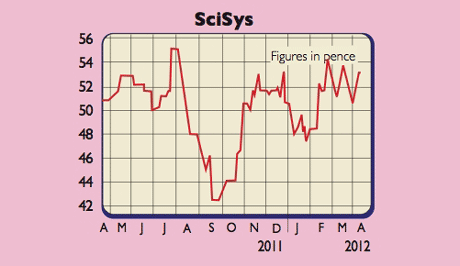Get the latest financial news, insights and expert analysis from our award-winning MoneyWeek team, to help you understand what really matters when it comes to your finances.
You are now subscribed
Your newsletter sign-up was successful
Want to add more newsletters?

Twice daily
MoneyWeek
Get the latest financial news, insights and expert analysis from our award-winning MoneyWeek team, to help you understand what really matters when it comes to your finances.

Four times a week
Look After My Bills
Sign up to our free money-saving newsletter, filled with the latest news and expert advice to help you find the best tips and deals for managing your bills. Start saving today!
Investing in microcaps can be an all or nothing experience. Either they invent the next best thing and their shares go to the moon, or they crash. Not so with IT outfit SciSys. Unlike some of its peers, it generates solid and predictable returns.
So, even in challenging conditions, the board expect profits will jump 20% this year. This is due to its niche technology and terrific client retention rate 74% of revenues are derived from customers who have been on the books for more than five years.
SciSys's expertise lies in developing bespoke solutions for the space, media, military and environmental sectors. It recently delivered its one-thousandth digital transmitter as part of Britain's switch over to digital TV. In 2011, it also won coveted deals with Lockheed Martin, the Met Office and the European Space Agency.
MoneyWeek
Subscribe to MoneyWeek today and get your first six magazine issues absolutely FREE

Sign up to Money Morning
Don't miss the latest investment and personal finances news, market analysis, plus money-saving tips with our free twice-daily newsletter
Don't miss the latest investment and personal finances news, market analysis, plus money-saving tips with our free twice-daily newsletter
What's more, with the exception of its environmental division, which is being hurt by government cutbacks, all of its business units are enjoying healthy growth. The media arm has been boosted by a £15m BBC contract. Meanwhile, the defence unit continues to sign up new work. As for its work in space, after completing the Galileo satellite navigation system, the division has secured big follow-on contracts to take Galileo to full operational capability.
SciSys (Aim: SSY)

All told, the December order book closed at £26.7m, underpinning house broker Canaccord's estimates for 2012 turnover and earnings per share of £43m and 7.16p, rising to £44.3m and 8.2p in 2013. The chief executive, David Jones, said 2011 had been another strong year with operating margins nudging up to 6%. These should be moving up towards the group's 7% target by the end of 2013.
On this basis I value the stock on an eight times EBITA multiple. With zero net debt, that produces an intrinsic worth of 75p a share.
There are a few risks. The British government's austerity measures could put a brake on performance. However, 55% of profits are earned overseas in Germany so the impact should be contained. SciSys is exposed to the usual risks surrounding small IT contractors and could be hit if the economy takes another dive or the euro currency declines significantly. Finally, the shares tend to be thinly traded, so if you do decide to buy, beware of inadvertently bidding up the price.
Rating: SPECULATIVE BUY at 51p (market cap £15m)
Get the latest financial news, insights and expert analysis from our award-winning MoneyWeek team, to help you understand what really matters when it comes to your finances.
Paul gained a degree in electrical engineering and went on to qualify as a chartered management accountant. He has extensive corporate finance and investment experience and is a member of the Securities Institute.
Over the past 16 years Paul has held top-level financial management and M&A roles for blue-chip companies such as O2, GKN and Unilever. He is now director of his own capital investment and consultancy firm, PMH Capital Limited.
Paul is an expert at analysing companies in new, fast-growing markets, and is an extremely shrewd stock-picker.
-
 Average UK house price reaches £300,000 for first time, Halifax says
Average UK house price reaches £300,000 for first time, Halifax saysWhile the average house price has topped £300k, regional disparities still remain, Halifax finds.
-
 Barings Emerging Europe trust bounces back from Russia woes
Barings Emerging Europe trust bounces back from Russia woesBarings Emerging Europe trust has added the Middle East and Africa to its mandate, delivering a strong recovery, says Max King